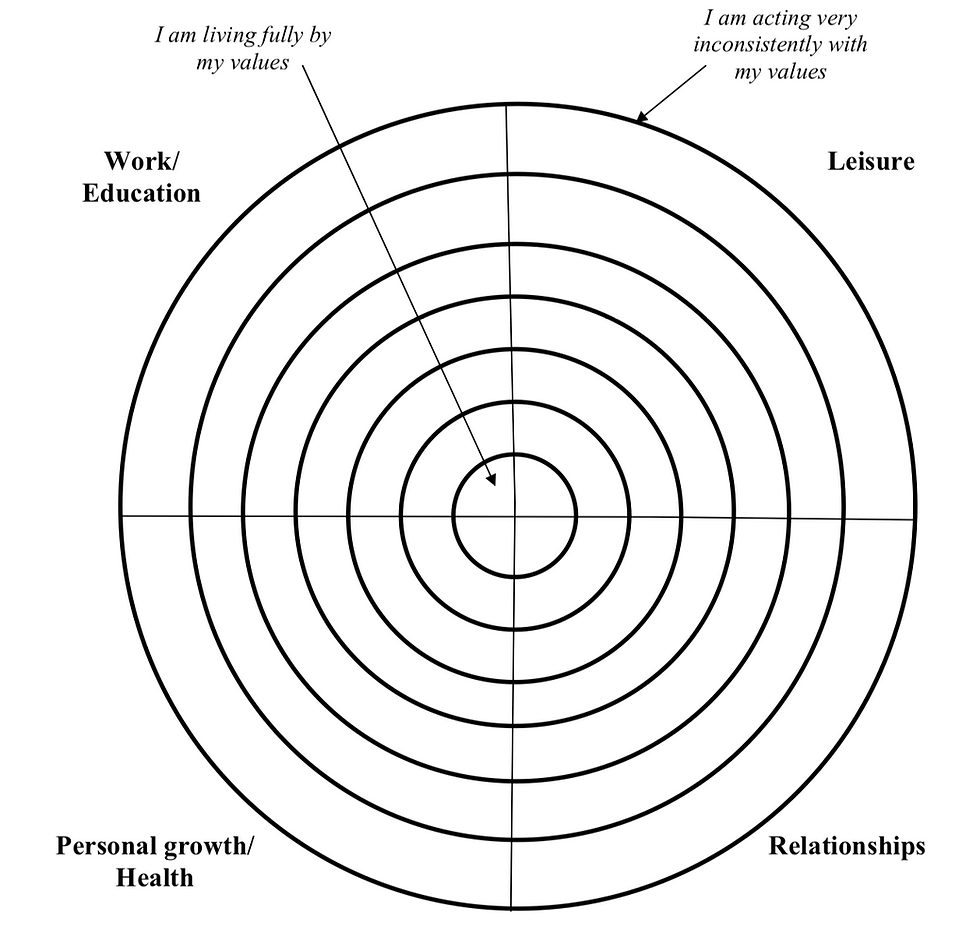ACT 2: Values
- Self-Care Library

- May 1, 2020
- 5 min read
Updated: May 31, 2020
It would be impossible to encapsulate the Acceptance and Commitment Therapy ethos without touching on values-driven living. Expanding on Act 1: Clean vs Dirty Discomfort, this article details a psychology-backed approach to the pursuit of wellbeing.

ACT 1 Recap: What is Acceptance and Commitment Therapy?
Acceptance and Commitment Therapy (ACT) is an established branch of psychological therapy that has been shown to effectively treat a wide range of clinical disorders (1 - 7), as well as improve wellbeing in "non-clinical" populations (individuals without any diagnosable mental health conditions) (6). Under the ACT framework, low mental wellbeing is thought to be influenced by two things: processing our negative emotions in unhealthy ways, and living our lives in a way that is detached from our most important values (which are different from person to person). In ACT 1: Clean vs Dirty Discomfort, we discussed healthy emotional processing styles. In this article, we expand this ACT repertoire further to touch on values-driven living. Our third ACT article, ACT 3: Hexaflex, will break down a more detailed model of ACT wellbeing, the 6-part “Hexaflex”.
ACT 2: Values
Psychological wellbeing is strongly influenced by having a sense of meaning in life (8). We look for this meaning in our daily activities, such as in our work or family lives. Without this, it is easy to feel purposeless or downhearted, which drains our psychological resources and increases negative emotions. In our last ACT article, we talked about the importance of processing negative emotions in a healthy way, which can also be applied in to cope with a lack of meaning. However, when struggling with a lack of meaning over an extended period of time, it is just as important, if not more so, to commit to positive action that targets the source of the problem. Under the Acceptance and Commitment Therapy framework, the key to finding this meaning is held in our values.
When starting out in life, we often try to connect with our values through our career choices. For example, someone who strongly values learning may find a career in research particularly enticing, and an individual who values socialising may be drawn to a career in sales. However, we often end up in situations where we can’t necessarily connect to those values in our jobs as much as we would like – our jobs can change or not live up to our expectations, unpredictable live-events can force us into careers that we may not have chosen for ourselves, or societal pressures can influence us to choose careers that never aligned with our personal values in the first place. Acceptance and Commitment Therapy proposes a series of activities that can enable us to take some more creative steps in pursuit of our “valued life”, and add some more meaning to our daily activities.
Values Bull's Eye
One of the core values-based exercises in ACT is the Values Bull's Eye. To complete this, we firstly define our personal values on the following topics (you may find some overlap between topics, or that some topics have completely different responses):
Work/Education: in our careers, workspaces, skills acquisition, etc. (for example: teamwork, competition, financial success, respect, etc.)
Relationships: such as romantic, familial, social, professional, etc. (for example: honesty, generosity, adventure, etc.)
Personal Growth/Health: more introspective values (for example: religion, exercise and nutrition, creativity, learning, etc.)
Leisure: what is important to you in seeking relaxation, entertainment, or fun (for example: variety, creativity, competition, etc.)
Then, make a mental "X" on the bull's eye below (2) to indicate how much you are engaging in your values for each topic in your current life.

Having completed this exercise, the ACT model recommends reflecting firstly on the barriers that are preventing us from fully engaging with our values in each dimension, and secondly on steps that we can take to move towards greater values engagement.
For example, under the current coronavirus epidemic, a lot of us are feeling disconnected from our social and professional lives in unprecedented ways. It is natural to feel more disconnected from our values in those areas as a result. However, having identified the core values that are absent or reduced in the present, can allow us to seek activities that involve those activities in more flexible ways - such as designing a project to target the value of helping others, or joining an online challenge to connect with the value of competition. Taking this focused approach to a feeling of purposelessness can help us get to the root of the issue. Combined with the healthy processing styles discussed in our previous article, this can allow us to take positive steps to living a life that is more personally meaningful for us, and therefore improving our wellbeing.
For a holistic view of this therapeutic style, ACT 3: Hexaflex
References:
Churchill, R., Moore, T., Furukawa, T., Caldwell, D., Davies, P., Jones, H., Shonohara, K., Imai, H., Lewis, G., & Hunot, V. (2013). 'Third wave' cognitive and behavioural therapies versus treatment as usual for depression. Cochrane Database of Systematic Reviews,10, No. CD008705. Doi: 10.1002/14651858.CD008705.pub2
Ducasse, D., Jaussent, I., Arpon‐Brand, V., Vienot, M., Laglaoui, C., Beziat, S., Calati, R., Carriere, I., Guillaume, S., Courtet, P., & Olie, E. (2018). Acceptance and Commitment Therapy for the management of suicidal patients: A randomized controlled trial. Psychotherapy and psychosomatics, 2018, 1‐12. Doi: 10.1159/000488715
Fogelkvist M, Gustafsson SA, Kjellin L, & Parling T. (2020). Acceptance and commitment therapy to reduce eating disorder symptoms and body image problems in patients with residual eating disorder symptoms: a randomized controlled trial. Body Image, 32, 155 - 166. Doi: 10.1016/j.bodyim.2020.01.002
Hunot, V., Moore, T., Caldwell, D., Furukawa, T., Davies, P., Jones, H., Honyashiki, M., Chen, P., Lewis, G., & Churchill, R. (2013). 'Third wave' cognitive and behavioural therapies versus other psychological therapies for depression. Cochrane Database of Systematic Reviews, 10, No. CD008704. Doi: 10.1002/14651858.CD008704.pub2
Kanter, J., Baruch, D., & Gaynor, S. (2006). Acceptance and Commitment Therapy and behavioural activation for the treatment of depression: Description and comparison. The Behaviour Analyst, 29(2), 161 - 185. Doi: 10.1007/bf03392129
Levin, ME, Krafft, J, Hicks, ET, Pierce, B, & Twohig, MP. (2020). A randomized dismantling trial of the open and engaged components of acceptance and commitment therapy in an online intervention for distressed college students. Behaviour research and therapy, 2020, 126. Doi: 10.1016/j.brat.2020.103557
Ruiz, F., Pena‐Vargas, A., Ramirez, E., Suarez‐Falcon, J., Garcia‐Martin, M., Garcia‐Beltran, D., Henao, A., Monroy‐Cifuentes A., & Sanchez, P. (2020). Efficacy of a two-session repetitive negative thinking-focused acceptance and commitment therapy (ACT) protocol for depression and generalized anxiety disorder: A randomized waitlist control trial. Psychotherapy, 2020 (02). Doi: 10.1037/pst0000273.
Garcia-Alandete, J. (2015). Does meaning in life predict psychological well-being? An analysis using the spanish versions of the Purpose-In-Life Test and the Ryff’s Scales. The European Journal of Counselling Psychology, 3(2), 89 – 98. Doi: 10.5964/ejcop.v3i2.27
Harris, R. (2014). The complete set of client handouts and worksheets by Russ Harris. https://thehappinesstrap.com/upimages/Complete_Worksheets_2014.pdf



Comments